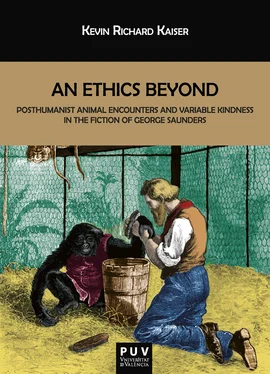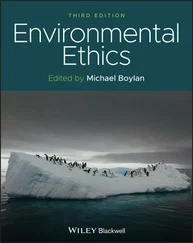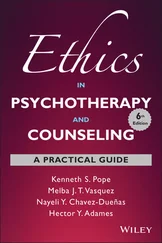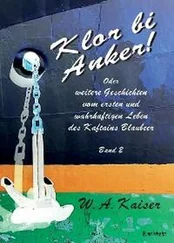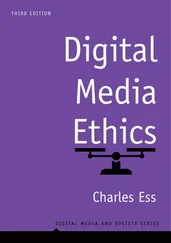As Braidotti understands it, capital “h” “Humanism” is a “mutation of the Humanistic ideal into a hegemonic cultural model” that by post-World War II was countered by a wave of anti-humanism (13-14). Posthumanism, while not inevitable, was presaged. The challenges to humanism only recently have led us to realize that “Man” is “in fact a historical construct and as such contingent as to values and locations” (Braidotti 24). The posthuman condition means accepting that what we once took as the cultural model, the humanistic ideal, is misplaced on many accounts. This condition interrogates “the very structures of contemporary science, politics and international relations. Discourses and representations of the non-human, the inhuman, the anti-human, the inhumane and the posthuman profligate and overlap in our globalized, technologically mediated societies” (Braidotti 2). These discourses and representations take on different forms for different theorists, but the intention of taking seriously nonhuman beings and not accepting a priori conceptions of the human remains the same.
Before continuing with an assessment of posthumanism, it is worth considering how the posthuman condition plays into Saunders’s fiction. Although Saunders does not consciously set out to write posthumanist fiction, his stories do relate to posthumanist concerns, presenting them as part of our everyday affairs. In his early stories, the protagonist is usually an “average Joe,” while in his later stories he employs different techniques to present the thoughts and actions of multiple characters coexisting. Frequently, the protagonists are forced to navigate the kinds of globalized societies, mediated by technology, that Braidotti mentions. 14Although they do not recognize the posthuman qualities of a world whose members, especially those in power, continue to enforce humanist ideologies, they are nevertheless left destabilized by their encounters, which are sometimes posthuman in nature. Unlike some fictional characters, those in Saunders’s fiction generally do not undergo epiphanies but do experience acceptance and/or regret. Likewise, ambiguity is not uncommon. Such ambiguity also works in a posthumanist way to allow the ethical register of the stories to remain open. As we shall learn, an actively open ethics—that is, one that does not point toward a specific moral or set of morals—is required by posthumanist ethics and is necessary to navigate a world in which our condition is posthuman and in which we count as our companions nonhuman animals, as well as, in the case of Saunders’s fiction, ghosts, mutants, and television characters. 15
The points made by Ferrando, Herbrechter, and Braidotti that I have outlined so far, when taken into consideration with the fiction of Saunders, present a conception of posthumanism shared by several cultural critics, especially those whose primary focus is on nonhuman animals. We can count alongside the aforementioned theorists Matthew Calarco, Donna Haraway, Kelly Oliver, Cynthia Willett, Cary Wolfe, Jason Wyckoff, and further posthumanist theorists, whether they call themselves such or not, all of whom demonstrate how posthumanist postulations are key to understanding our current condition and necessary to remedy the errors and omissions of humanism. I also add to this list Jacques Derrida, as many of the theorists frequently cite his writings and draw from his ideas. However, since posthumanism is a relatively recent field and, by its very nature, requires freedom and flexibility, many of these theorists use their own terminologies. Just how their concepts relate, then, may not be obvious, but by sampling a variety of approaches, we can gain a better understanding of each theorist’s formulations.
To start with, Braidotti postulates that “the common denominator for the posthuman condition is an assumption about the vital, self-organizing and yet non-naturalistic structure of living matter itself. This nature-culture continuum” stands as the shared starting gate of posthumanism (3). As we shall discover, what for Braidotti is a continuum is posited variously depending on the critic. For Haraway, who has famously written manifestos on cyborgs and companion species, 16living with, or “becoming with” promises a more equitable and peaceful autre-mondialisation , or other-globalization (WSM 3). For Oliver, an ethics of difference means not beginning with a predetermined set of differences, dualisms, or binaries. For Wolfe, the discourse of species is a discussion that must remain open if we are to work through theory toward an ethical pluralism. For Wyckoff, avoiding a language of dominionism is key. Neither Haraway, Oliver, Wolfe, nor Wyckoff accept humanism’s delimitations any more than they accept or redraft any notion of the human. Like them, Braidotti’s senses of the posthuman and postanthropocentric relate her “rejection of the principle of adequation to the doxa, or commonly received normative image of thought” (2013, 104). That “normative image of thought” is the conception of the human we have received from humanism: the human as central being to that which gives name to humanism (and the Humanities). What the posthuman condition demands is that philosophy and ethics no longer take for granted the human as the prime agent, the principle subject, the paramount being.
For Braidotti, this condition is a “predicament” in both the posthuman and postanthropocentric senses. She emphasizes “the idea that the activity of thinking needs to be experimental and even transgressive in combining critique with creativity” (2013, 104). In short, what Braidotti is proposing is that thinking is action: how we think is as important as what we think about. Thinking in terms of the posthuman means thinking posthumanism in a posthumanist way—critically, emotionally, and viscerally. Thinking must remain an active process—(re)creative, (de)constructive—if we are to avoid delimitations. Unyoking thought from anthropocentricity or any other doxa , in Braidotti’s sense of the term, means that this very thinking cannot arrive at any definitive end.
In the introduction to his influential study, What is Posthumanism? (2009), 17Cary Wolfe asserts that what is intended by the “post-” of posthumanism requires it to be posthumanist. According to Wolfe, posthumanism is not “posthuman at all—in the sense of being ‘after’ our embodiment has been transcended—but is only posthumanist, in the sense that it opposes the fantasies of disembodiment and autonomy, inherited from humanism itself” (xv). This is not meant to imply that our definition of the human is somehow strictly analog to (bodily) transcendence. For Wolfe, it remains undefined, as he insists in his earlier book, Animal Rites: American Culture, the Discourse of Species, and Posthumanist Theory , that “the ‘human,’ we now know, is not now, and never was, itself” (2003, 9). His sense of posthumanism confronts the disembodied, autonomous, rational subject that he, like his fellow posthumanist theorists, cites as the sense of the human we have inherited from Renaissance humanism. For him, posthumanist posthumanism differs from both transhumanism and what he calls humanist posthumanism because it makes no attempt to realize the human according to a binary distinction, especially not a human/animal division, that escapes or represses “not just its animal origins in nature, both biological and evolutionary, but more generally by transcending the bonds of materiality and embodiment altogether” (WP xv). Nor does his articulation of posthumanism resort to coercing and constraining humanist ideology into posthumanist terminology. In other words, the human of posthumanism, as animal, is biologically and evolutionarily continuous with the physical world from which it evolves and to which it remains contiguous.
Читать дальше
